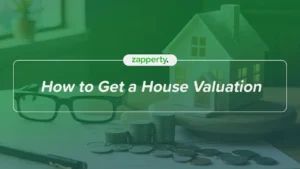Whenever buying or selling a property is mentioned, people often ask about Capital Gains Tax when selling a home. Although the rules are relatively simple, they have been changed in recent times and there are some important details that people often miss.
Read our guide to find out more about capital gains tax when selling a home; how it affects homeowners, how you can calculate it and what exemptions exist.
What is Capital Gains Tax?
Capital Gains Tax (CGT) is a tax imposed by the UK government on the profit made when an asset (a house or similar) is sold for more than it was purchased. These assets can include property, shares, and other investments. Simply put, it’s a tax levied on the increase in value of an asset over time.
It can be complicated though
The UK’s CGT system has been a subject of debate for many years, with criticisms ranging from its complexity to its impact on investment and economic growth. While it is intended to ensure a fair distribution of wealth, some argue that it can stifle entrepreneurial spirit and hinder property market fluidity.
What is the benefit of Capital Gains Tax for homeowners?
The UK offers a significant tax advantage for homeowners: the Primary Residence Exemption (PRE). This means that generally, no Capital Gains Tax (CGT) is payable on the profit made from selling your main home.
To qualify for the full exemption, you must have lived in the property as your main residence for the entire period of ownership. Partial exemptions exist for periods when the property wasn’t your main home. However, specific conditions and calculations apply.
How to calculate Capital Gains Tax
To calculate capital gains on a home sale, you just need to subtract the original purchase price – including all the legal fees – from the sale price. This gives you your total profit.
However, you can often claim exemptions or reliefs. The Primary Residence Relief is significant, potentially exempting the entire gain if you’ve lived there continuously.
If you haven’t lived there continuously, you could get partial relief, based on periods of occupation. Other factors like improvements or additional properties can also impact the calculation.
How to reduce Capital Gains Tax
Capital Gains Tax is only charged on what you have gained – not the actual sale price you get. So, there are various ways you can reduce and minimise or even eliminate the capital gains tax you’ll pay, but it’s always best to seek professional financial advice first.
- Deduct costs such as conveyancing and estate agent’s fees as well as Stamp Duty – this could include costs such as paying for an extension.
- Offset losses from selling other assets.
- Consider joint ownership with your spouse – everyone has a CGT allowance, so you can double it by sharing ownership with your spouse.
- Delay the sale of your property to the next tax year.
- Nominate the property as your main residence, however, these rules are strict.
- Claim Letting Relief.
Reporting the sale: when should you let the HMRC know?
You typically need to report any capital gain from selling your home to HMRC. If your total gain exceeds the annual exempt amount or the sale proceeds are over a certain threshold, you must report it.
You can report your gain through your Self Assessment tax return or using HMRC’s online ‘real-time’ service. The deadline for reporting depends on the method you choose.
It’s essential to keep accurate records of the purchase price, sale price, and any costs related to the property. These records will be crucial when calculating your capital gain and completing the report.
Capital Gains Tax on multiple homes
Owning and selling multiple homes can complicate CGT calculations.
There are a few important rules:
- Primary Residence Relief (PRR): Only one property can be your main home. This property is exempt from CGT.
- Additional Dwellings Relief: If a property was once your main home, you might qualify for partial relief, even if it’s now rented out.
- Lettings Relief: Offers partial relief if a property was your main residence and let for part of the ownership period.
- Multiple Dwellings Relief: Applies to properties built specifically for long-term letting, offering potential CGT reductions.
Capital Gains Tax on rental properties
If you sell a rental property, you’ll likely owe Capital Gains Tax (CGT) on the profit made. Unlike your primary residence, there’s no automatic exemption.
However, some reliefs might apply:
- Lettings Relief: If you lived in the property for part of the ownership period and then rented it out, you might qualify for partial relief.
- Additional Dwellings Relief: If you once lived in the property but it’s no longer your main home, you might qualify for partial relief.
The rate of CGT varies depending on the type of asset and the individual’s tax band. For most individuals, the current CGT rate is 18% for basic-rate taxpayers and 28% for higher-rate taxpayers. However, these rates can be significantly higher for certain assets, such as residential property.
Learn more about property taxes when selling in the UK in our latest guide: How Much Tax Do You Pay When You Sell Your House in the UK?
Reporting Home Sale Proceeds
When you sell a property, accurately reporting your home sale proceeds to tax authorities isn’t just a legal requirement—it’s crucial for staying compliant with tax rules and potentially saving money through exemptions and deductions. Whether you’re selling your primary residence, an investment property, or a home abroad, understanding the reporting process is key to avoiding unnecessary penalties.
How to Report Home Sale Proceeds
The process for reporting property sale proceeds to HM Revenue & Customs (HMRC) in the UK or equivalent authorities abroad depends on the type of sale and the ownership structure. In the UK, sales that trigger non-excludable gains must be reported within specified timeframes.
Steps to Report:
- Use HMRC’s Online Real-Time Service: This online platform allows sellers to report gains without waiting for the end of the tax year. It’s especially useful for those who prefer digital convenience.
- Self-Assessment Tax Return: If you’re already registered for self-assessment, include the sale details in your annual tax return. Ensure you account for all deductible expenses.
- Documentation Needed:
- Form 1099-S (for international property sales in certain jurisdictions).
- Receipts for legal fees, improvement costs, and other deductible expenses
- Accurate details of your purchase price and sale price
The Publication 523 by HMRC can serve as a guide for calculating gains and reporting them correctly.
Ownership Structures and Implications
The way your property is owned affects how you report proceeds. Here’s how different ownership structures may influence the process:
- Individual Ownership: If you’re the sole owner, you report the entire gain on your tax return, and the tax rate is determined by your income tax band.
- Joint Ownership: Proceeds are divided based on the ownership share. Each party is responsible for reporting their portion.
- Corporate Ownership: Properties held by corporations require compliance with corporation transferor rules. These transactions may involve unique reporting processes, especially if the transfer qualifies as a de minimis transfer.
- Exempt Volume Transferor: Certain smaller-scale or frequent transactions may qualify for exemptions under this rule, but it’s essential to verify eligibility.
Reporting International Property Sales
If you’re selling a property overseas, the reporting process becomes more complex. UK residents must declare gains from foreign properties, and international sales may trigger additional tax obligations both in the UK and the property’s host country.
Key Considerations:
- Double-Taxation Treaties: These agreements can prevent paying tax twice on the same gain.
- Currency Exchange Rates: Record the rates on the purchase and sale dates to calculate your gain accurately in GBP.
- Local Tax Rules: Some countries require sellers to settle local tax liabilities before transferring sale proceeds internationally.
If you’re unsure how to navigate international sales, consulting a tax adviser familiar with both UK and foreign tax systems is highly recommended.
Special Situations Affecting Capital Gains Tax
Certain life events or unique circumstances can influence how Capital Gains Tax (CGT) applies. Understanding these situations can help you maximise reliefs or exclusions while remaining compliant.
Let’s explore some unique situations:
Widowed Taxpayers
Widowed taxpayers may qualify for special CGT rules, particularly if the property was jointly owned with their late spouse. The use requirement for the capital gains tax exclusion may still be met if the property served as the main residence during ownership.
Key Benefits for Widowed Taxpayers:
- You may inherit your spouse’s CGT exemption if the property was their main residence.
- If you sell within a certain timeframe, you can exclude gains of up to £500,000 (for married tax filers) rather than the standard £250,000 for individuals.
Divorce
Divorce often involves transferring or selling properties, which can complicate CGT calculations. Transfers between spouses during the tax year of separation are typically CGT-exempt. Beyond that period, tax implications vary depending on the property’s usage and ownership split.
CGT Considerations for Divorce:
- If the property was your main residence, you may qualify for private residence relief.
- If one spouse continues to live in the property, the other may defer CGT liability until the property is sold.
- Consulting a tax adviser can help ensure compliance while minimising tax liabilities during asset division.
Military Personnel
Frequent relocations for military personnel can disrupt the use requirement for CGT exemptions. However, exceptions exist to accommodate these circumstances.
Special Provisions for Military Personnel:
- Periods of deployment are often treated as periods of occupancy, allowing for private residence relief.
- If you rent out your property during deployment, you may still qualify for partial relief under specific rules.
By keeping thorough records and working with a knowledgeable tax adviser, military personnel can make the most of available reliefs while simplifying the reporting process.
How does mortgage debt affect Capital Gains Tax when selling a home?
Mortgage debt generally doesn’t directly impact your Capital Gains Tax (CGT) calculation. However, mortgage interest relief can affect your overall tax position. While no longer available for most homeowners, it might still apply in certain circumstances. Additionally, if you use a mortgage to fund improvements, these costs can be added to your purchase price, reducing your potential CGT liability.
What about using a company like Zapperty – can that affect the Capital Gains Tax I pay?
How quickly you sell your property doesn’t directly affect the Capital Gains Tax calculation itself. However, there could be indirect impacts if for instance, you use a cash buying company like Zapperty, you may be accepting a lower offer – while not paying legal and conveyancing fees, estate agency and other costs – none of which are deductible against capital gains tax. So your overall profit, and therefore potential CGT liability, could be reduced.
Looking to sell your house fast? Our goal is to buy your property in 7 days or less. There is no faster way to sell a home in the UK.
Our team has decades of experience. We know what it takes to buy a house quickly and what pitfalls to avoid. We’re here to help you. Simply tell us what your timeline is, and we’ll do our best to meet it. Sell your property as fast or as slow as you like. Get in touch today.




